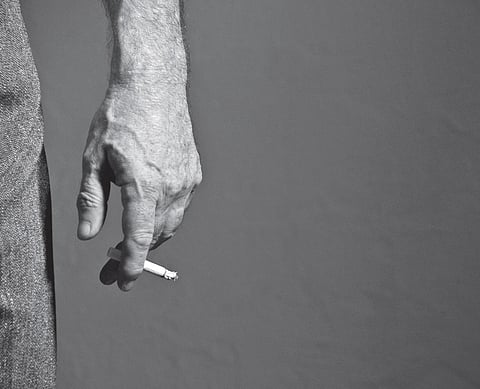

Do you smoke? If you are one of those who just confidently shook his head, look around and think again.
A recent study reveals that passive or second-hand smoking can have adverse effects on memory and thinking power.
Air-filled with smoke affects functions of the brain and may lead to dementia. American researchers conducted a study on the lifestyle of 5,921 men and women in China.
The mental state of each participant was examined to find out whether they suffered from dementia or not, and then relevant questions were put before them.
They were asked to reveal their exposure to second-hand smoke during their lifetime.
Results indicated that those exposed for a longer period of time had 29 per cent more chances of developing severe dementia in old age than those who had no exposure to smoke.
According to the American Lung Association, second-hand smoke contains more than 7,000 chemicals, hundreds of which are toxic and approximately 70 of which are known to cause cancer.
When smokers exhale these chemicals in the air, they cause harmful damage to the health of passive smokers too.
The study adds that besides causing cardiac and stroke, the practice also leads to dementia.
“Most of the time, the smoke we inhale is less dangerous than the smoke we exhale as the quantity of smoke we inhale is lesser than the quantity we exhale. Besides, the filters of the cigarettes not only trap many of the chemical released during smoking but also reduces the amount of smoke which goes directly to the lungs. But during exhaling, there is no boundary of filter.
"Smoking releases many harmful chemicals in the air which slowly and gradually narrow the blood vessels of the brain, which in turn leads to vascular dementia. These chemicals also affect neutrons of the brain, which is yet another reason for vascular dementia,” explains Dr A Marthanda Pillai, neurosurgeon at Ananthapuri Hospital, Thiruvananthapuram.
Nicotine, which is present in the smoke, kills brain cells and also stops the formation of new ones in the hippocampus area of the brain, which deals with memory, learning and other cognitive functions.
Smoking increases exposure of the nicotine to the air and hence non-smokers also face the ill-effects, Dr Pillai adds.
There are many types of dementia, most common being Alzheimer’s which is linked with increased age, besides being genetic.
The second-most common is vascular dementia. Dr Anshu Rohatgi, neurologist at Sir Gangaram Hospital, Delhi, says, “Passive smoking should be taken seriously as it is an important risk factor in developing dementia. By avoiding second-hand smoke, passive smokers can reduce the problems of dementia. It has been seen that non-smokers inhale 60-80 per cent of airborne nicotine. Only 20-30 minutes’ exposure to bad air increases the risk of heart attack and stroke, can cause excess blood clotting and also prove a contributing factor to increase the rate of buildup of fat deposits in the blood vessels. So if your partner or family members are smokers, you are also at risk.”
It has been observed that passive smoking increases the risk of coronary heart diseases too, which is indirectly linked to vascular dementia.
In another study, which was discussed at the EuroHeartCare, it was found that passive smoking was linked to a 13 percent increased risk of hypertension; living with a smoker after age 20 was associated with a 15 percent greater risk; and exposure to passive smoking for 10 years or more was related to a 17 percent increased risk of hypertension. Men and women were equally affected. “Second-hand smoking has been associated with increased risk of cancer and cardiovascular diseases,” affirms Dr Vinit Suri, neurologist at Apollo Hospital, Delhi.
It is not just the older generation that is at risk with second-hand smoking. Nicotine exposure hampers the development of the brain cells at a very young age. Small children face very high risk of passive smoking as they breathe at a faster rate.
A recent study published in JAMA Ophthalmology states that second-hand smoke affects children directly by making their choroid thinner, which in turn, may lead to various eye disorders, such as cataract and age-related macular degeneration (AMD) later in life.
How to avoid second-hand smoke
Discourage people to smoke in front of you or in close proximity
Avoid smoking at home and closed premises
Try to open windows and use fans to ventilate rooms from time to time
Avoid ashtrays at homes and working place
Smoking for five minutes is enough to stiffen the aorta, even with just one cigarette
Dangerous chemicals linger in the air for almost about 4 hours after smoking and breathing these in for only a few minutes can harm you
20-30 minutes of smoking causes excess blood clotting, as well as increases the buildup of fat deposits in blood vessels, increasing the risk of heart attack and stroke
2 hours of smoking increases the chance of irregular heartbeat (arrhythmia) and can trigger a fatal cardiac event or heart attack
It causes eye and nasal irritation; leads to increased risk of sinus and respiratory infections